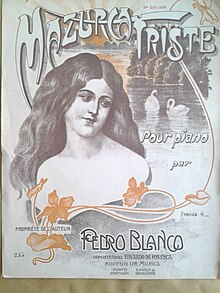Pedro Blanco López
Pedro Blanco López (born July 14, 1883 in León , Spain , † May 1, 1919 in Porto , Portugal ) was a Spanish composer , pianist , teacher and music critic .
biography
Blanco was born as the son of the musicians Mateo Blanco del Río and Emilia López y Moya and began his musical education under the direction of his father in León. From 1897 he studied at the State Academy of Music in Madrid with the renowned professors Felipe Pedrell and Andrés Monge. Throughout his life he had a lively written exchange with both of them and with Tomás Bretón . In 1902 he won the first prize for piano at the music college. Blanco began his career as a piano player in Madrid; it should lead him to Porto - there he lived from 1903 until his death. The marriage with Clementina Nogueira in Porto resulted in two sons. Shortly after arriving in Portugal, he joined the literary and artistic community of the coastal town of Espinho . Well-known personalities of this artist group were u. a. the painter Amadeo de Souza-Cardoso , the poet and pedagogue João de Barros and above all Dr. Manuel Laranjeira. It was through him that Blanco met other intellectuals, including Miguel de Unamuno, with whom he had been a pen friend for many years.
For a decade, Pedro Blanco played an important role as a piano teacher in the education of numerous music students. He was also a member of the first faculty at the Porto Conservatory; there he taught from 1917 until his death. In the first two decades of the 20th century , Blanco was actively involved in Porto's vibrant cultural life. a. in cultural movements like the Renascença Portuguesa . He was a passionate and charismatic artist. His considerable influence on the artist community is undisputed and he used it to carry out important social tasks. In the city on the Duero he maintained close friendships with important personalities such as the sculptor António Teixeira Lopes, the draftsman Leal da Câmara and the writer Antero de Figueiredo. He also exchanged letters with important national and international personalities from the fields of art and music.
In 1911 Pedro Blanco was appointed a corresponding member of the International Music Society in Porto. Among his musicological work, an introductory essay on Portuguese folk music for the French magazine SIM [i] caused a sensation. As a writer, Blanco made a name for himself with many publications in - mainly Spanish and French - newspapers and magazines in various areas, such as music criticism, "Regeneracionismo", in the defense of the social status of musicians and in the context of cultural dissemination between the two neighboring countries Spain and Portugal. Blanco played an important role in the Spanish-Portuguese cultural exchange, which has been forgotten to this day, and made an active contribution to the development of cultural Iberism . Lopez died of the Spanish flu on May 1, 1919, at the age of 36 .
Musical work
Despite his early death, Pedro Blanco left behind about twenty works for piano, piano and voice, violin and piano and also orchestral works.
Piano music:
- Mazurca Triste (Op. 1) .
- Hispania (Op. 4. Also orchestrated by Lucien Lambert).
- Heures Romantiques. Impressiones Intimes (Op. 6).
- Galanías (Op. 10).
- Dos mazurcas: Del amor y Del dolor (Op. 12) .
- Castilla (Op. 16) .
Works for piano and voice:
- ¡Guitarra mía! (Op. 2).
- Los ojos negros (Op. 3).
- Canções : “O Senhor Reitor”, “Flor da Rua”, “A Fiandeira” ( Op.5 ).
- Dos melodías : "Rosa e lírio", Barca-bela ( Op. 9 ).
- Cantiga e Trovas do longe ( Op. 11 ).
- Duas melodias para piano e canto : "Madrigal", "Quand même" ( Op. 14 ).
Works for violin and piano:
- Romance y Zambra andaluza (Op. 7).
Orchestral works:
- Añoranzas ( Op. 8 ).
- Duas melodias portuguesas : “Anjo da Guarda”, “Noite de Amores” ( Op. 13 ).
- Concierto en si menor (for piano and orchestra, Op. 15 ).
Web links
- Blog Añoranzas y saudades : Information about Pedro Blanco (Spanish).
- Festival de Música Española : CDs, concerts and exhibitions (Spanish).
- Pedro Blanco: A vida ea obra para piano : Doctoral thesis by Nuno Caçote (Portuguese).
- Pedro Blanco en Folklorismo en Cosas de mi Tierra : Article in Folklorismo by Eduardo Sánchez de Fuentes, published in 1928 by Imprenta Molina y Compañía, Ricla, Num 55–57 in La Habana (Spanish).
- Compositor Pianista Período Pós-Romantico Nasceu em Espanha ... : composer and pianist from the post-romantic period ... (Portuguese).
Individual evidence
- ↑ Martínez-Pereda, José Antonio (2019). Añoranzas y saudades. Descubriendo al músico Pedro Blanco (León, 1883 - Oporto, 1919) . CSED. ISBN978-8492814749.
- ↑ Martínez-Pereda, op. Cit ., P. 261-262.
| personal data | |
|---|---|
| SURNAME | Blanco López, Pedro |
| BRIEF DESCRIPTION | Spanish composer, pianist, teacher and music critic |
| DATE OF BIRTH | July 14, 1883 |
| PLACE OF BIRTH | Leon |
| DATE OF DEATH | May 1, 1919 |
| Place of death | postage |
